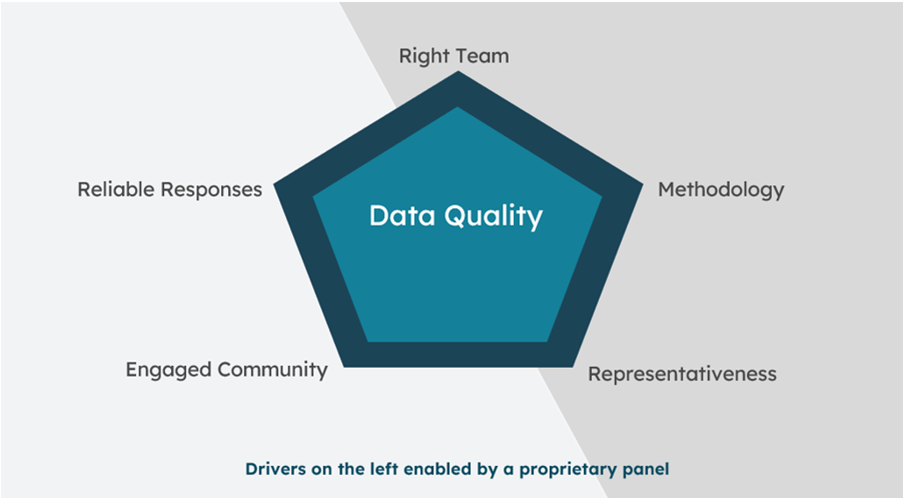Vypr and data quality – Methodology

Welcome to the first article in a 5-part series on all things data quality here at Vypr.
We appreciate that you may be concerned about Data quality, and you’re not alone.
According to a recent GRIT report on the importance of Data Quality, poor sample quality is ‘plaguing’ the insights industry.
When you speak to your audience, they need to be relevant, credible and real. One of the concerns highlighted in the report is that “They may pretend to be someone they are not in order to qualify, create fake identities in order to take a survey multiple times, or take so many surveys that they cannot possibly be paying attention to the questions.”
Here at Vypr, we are passionate about data quality. It’s in our Vypr DNA. We base Data Quality in 5 areas:

The first area we plan to look at is Methodology.
The Vypr platform was created to provide the most robust data available, allowing our consumers to answer questions as quickly and simply as possible. Our panel is proprietary,meaning it’s uniquely our own so we can recruit and maintain the best audiences.
Our consumer app is mobile-only which means they can answer on the go, for example, if they have a spare 5 minutes free they can take a look to see what’s available.
As we look at our methodology, we provide single steer questions, rather than long-winded surveys. This means consumers can pop in and out of the app as and when they like, without committing to a full survey where they lose interest halfway through.
Research such as Ye LI’s 2021 University of California study demonstrated that longer surveys tend to produce inaccurate results. After many questions, people start to fatigue and their answers become less predictive of actual behaviour.
We are proud that our methodology is driven by behavioural science, which is based on understanding how people react psychologically and respond behaviourally to interventions, environments and stimuli. This comes from Daniel Kahneman, psychologist, economist and author of books such as Thinking, Fast and Slow.
This is where System 1 and 2 methodology thinking is used to help integrate behaviouralscience in research. System 2 methodology is where decisions made are calculated, conscious and slow. For example, when filling out a form, you’re thinking about what you’re writing in each box.
Contrast this to System 1, which is what Vypr uses, which is fast, subconscious and automatic. For example, when shopping at the supermarket, we don’t spend a long time at the milk fixture deciding what to buy, we quickly pick up what we want and what appeals to usbefore moving on.
It is why we use the single steer methodology, so our consumers can answer impulsively before moving on to the next steer if they so choose.
Our steers provide monadic and comparative methodologies to allow robust testing. This enables you to test every element of a product idea to cover various scenarios e.g A/B blind tests or testing your idea against the competition.
Vypr steers also address the concern of primacy bias (the tendency to more easily recall information that we encounter first), as our options can be randomised and have different start points.
There is also an option to remove the randomisation to ensure the consumer does not find questions jarring – mainly about options related to chronological frequency and dates. This is because, for example, the days of the week are familiar and to see them out of order doesn’t feel ‘natural’.
Our 22 different steer types allow you to create steer chains using mixed methodologies, for example, starting off using Qual (Sentiment, VyPops) and further substantiating it with Quant (Preference, Split by’s).
Finally, regarding concerns about dishonesty within answers, we actively run ‘Honesty prompts’ that can detect fraudulent responses. These prompts are simply to identify those who are randomly selecting any option, rather than answering correctly. Those who incorrectly answer the prompts are warned and are removed from the panel if they continue to do so.
These are some of the ways our methodology helps combat data quality. We are proud of our methodology and proprietary panel. With this, we can control and target our audiences for you to ensure you can speak to your consumers directly and quickly without the concern of dishonest accounts.
Next month, we will look at Representativeness, but in the meantime, if you do have any questions please get in touch with us and we will be more than happy to help.







